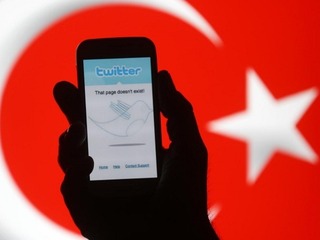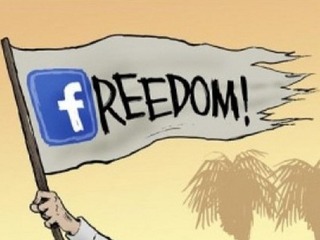
(Come mingle with hundreds of top venture capitalists representing $10B-plus in capital under management, including Khosla Ventures, Greylock and Javelin Venture Partners, and learn from founders/CEOs including Marco Zappacosta, Co-founder & CEO of Thumbtack and Adam Goldenberg, CEO of JustFab, Slava Rubin, Founder & CEO of Indiegogo, at Vator Splash Oakland on April 22nd and 23rd. Get your tickets here!)
(Updated with comment from Twitter and Facebook)
The Turkish government has a pretty fractured relationship with social media, in that it seems to hate it and always seem to be trying to ban it over one thing or another. Now, once again, social media sites are fighting themselves in a fight with the government over censorship.
The latest kerfuffle between these two sides involves pictures taken of an Istanbul prosecutor being held at gunpoint. The photo, which made the rounds on social media last week, was taken mere hours before that prosecutor was then killed in a shootout, according to a report from Reuters on Monday.
As a result of these pictures being disseminated, a Turkish court requested that they be taken down from various social media sites, including Twitter, YouTube and Facebook. When Twitter and YouTube refused to comply, both sites had their access blocked in the country.
Of those three, Facebook was the only one to comply with the order, though the company is in the process of appealing that decision, a spokesperson confirmed to VatorNews.
“We received valid court orders from the authorities in Turkey requiring us to restrict access to certain content. We have complied, but are appealing,” a Facebook spokesperson told me.
After a day of being banned Twitter is said to have announced it will be complying with the order, so that service will be restored, though a Twitter spokesperson would only point us toward the following tweet:
We are aware of reports of interruption of our service in #Turkey, and we are working to restore access for our users as soon as possible.
— Policy (@policy) April 6, 2015
Update: A Twitter spokesperson has now confirmed to VatorNews that the company is complying with the order and that, like Facebook, Twitter intends to appeal the Turkish court order.
That leaves YouTube as apparently the only one left that is still defying Turkey’s court order.
“We are seeing reports that YouTube is blocked in Turkey and we’re working to restore the service for users as soon as possible,” a YouTube spokesperson told VatorNews.
The government is obviously taking the posting of the pictures very seriously, with a presidential spokesman Ibrahim saying that sharing the picture was akin to “spreading terrorist propaganda.” It is also pointing to the effect on the prosecutor’s family as a reason to ban these pictures.
“The wife and children of prosecutor Kiraz have been deeply upset. The images are everywhere,” a senior Turkish official told Reuters. “A request has been made to both Twitter and YouTube for the removal of the images and posts but they have not accepted it and no response has been given. That’s why this decision has been taken through a court in Istanbul.”
These points do have some validity, but it would be easier to take these kind of statements at face value if this was the first time either Twitter or YouTube had been banned in Turkey. However the government has been going after both sites for a while now, and this seems like it is most likely just another excuse to take them down.
In March of last year, the country banned Twitter after Prime Minister Tayyip Erdogan was accused of corruption on the service. The ban also happened to take place around a week before local elections were to take place in the country on March 30.
Of course, neither of those is not the official reason the government is giving for the move. Instead, they accused Twitter of refusing to remove certain links from its site, which have been deemed illegal by the country’s courts. After two weeks, the courts ordered the government to turn the service back on.
After that defeat, the government vowed to go after Twitter again, this time regarding its taxes.
In addition to Twitter, the Turkish government also banned YouTube last year. The service was shut down on March 27th after a video appeared on the site with audio from a conversation between Turkey’s foreign minister, spy chief, and a top general in a high-security meeting that centered on the military situation in Syria. A court deemed that ban unconstitutional, saying that it was too broad. The decision still allowed the government to ban 15 individual videos.
In February it was revealed that the Turkish government was still trying to crack down on Twitter. It made 356 requests for information on 496 accounts, an increase of over 150% from the first half of the year. Twitter did not provide information in response to any of those requests.
The country also made a total of 477 removal requests in six months, on 2,642 accounts. That number is alarmingly high; no other country had even 100 requests, with Russia coming in second with 91These requests “generally focused on claimed violations of personal rights (such as defamation) of both private citizens and government officials,” Twitter wrote in a blog post.
Unlike with the government information requests, Twitter complied in 50% of Turkey’s requests for removal, but not without a fight: it filed court objections in response to over 70% of the Turkish court orders we received. It won 5% of those appeals, lost 80% , and still has 15% pending with the courts.
The issue of censorship on social media is a tricky one, and networks have not always shown the best judgment in trying to decide what to allow, and not allow.
Facebook has gotten itself into trouble before, over videos and pictures of mother’s breastfeeding, as well as women showing their mastectomy scars. The company also allowed a video of a woman being beheaded to make the rounds, before reversing that decision and banning it, after finding that many were glorifying the violence in the video rather than condemning it.
The issue has become so fraught that the company recently felt the need to make explicitly clear what is,and is not, acceptable behavior on the site. But that will not solve the problem of where the line gets drawn on images that some may find disturbing or in bad taste.
Should these sites be allowed to show these photos? Sound off in the comments section.
(Image source: redherring.com)
























